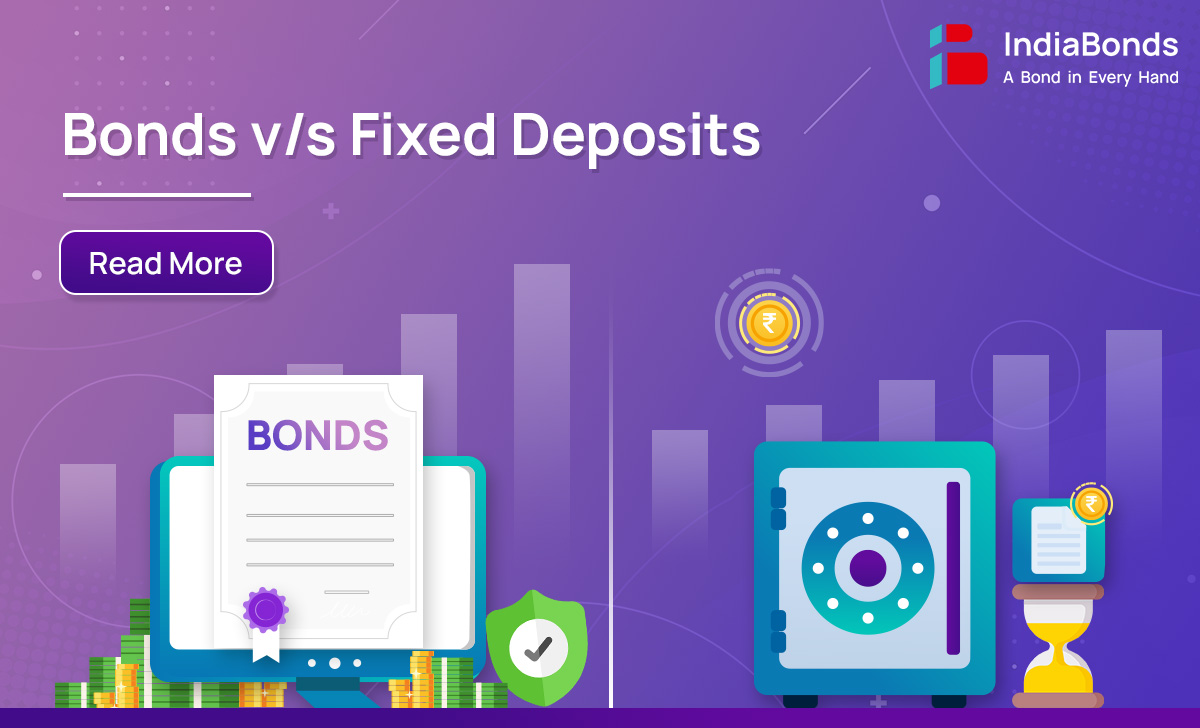Bonds vs Fixed Deposits

In the world of fixed income securities, Bonds and Fixed Deposits (FDs) are two dominant players, each with its own advantages and limitations. While FDs are widely used, bonds remain largely overlooked. In 2017, SEBI conducted a survey* to study investment patterns in households, which revealed that over 95% of households, preferred FDs as their investment option, with only 10% opting for mutual funds and stocks. Despite Fixed deposits being a slow investment vehicle known to corrode your investments due to their incapability to provide returns above the inflation rate, Fixed Deposits make up for a large portion in Indian holds. In comparison, Bonds are a much better and secure investment alternative albeit lesser known. Bond investing is still not popular for two primary reasons: a heavy reliance on FDs and a lack of awareness regarding bonds (this is changing now with SEBI registered platforms like IndiaBonds.com). Which brings one to the question what is the difference between fixed deposit and bonds? What makes Bonds a better investment alternative to Fixed Deposits?
What is a Bond?
A bond is a financial instrument representing a loan made by an investor to a borrower, typically a corporation or government. Bonds are issued for a fixed period and pay periodic interest to the investor, with the principal repaid at maturity. They are often seen as a safer investment option compared to equities, offering steady returns and portfolio diversification. When comparing fd vs bonds, bonds provide more flexibility in terms of tenure and returns.
What is a Fixed Deposit?
A fixed deposit (FD) is a financial product offered by banks and financial institutions, allowing investors to deposit money for a fixed tenure at a predetermined interest rate. FDs are popular for their assured returns and low risk, making them a go-to choice for conservative investors. While comparing fixed deposits vs bonds, FDs are more suitable for those seeking simplicity and guaranteed returns over a specific period.
Before delving into the key differences between fixed deposits and bonds, it’s important to address why Indians tend to rely heavily on FDs. Fixed deposits are a go-to investment option for the ones who aren’t aware. Most of the savings in India are parked in FDs under the assumption that they are a safe investment.
Here are some truth bombs:
Contrary to popular belief that Fixed Deposits are a secure form of investment, Fixed Deposits (FDs) in actuality are not subject to regulation. While they are insured under the DICGC scheme for up to Rs. 5 lakhs, it is important to note that the 5 Lakhs comprises of the total money held with the bank across all your accounts. E.g. all Savings account, FDs etc. it is important to note that close to 50% of banks*, are not insured under DICGC and therefore do not insure your sum for 5 Lakhs.
In certain cases, such as with Lakshmi Vilas Bank, placing an account under moratorium can result in a capped daily withdrawal limit. This means that the account holder will be restricted to withdrawing a maximum amount each day until the moratorium period has ended.
When it comes to FD vs Bonds, It’s quite ironic that despite the failures of well-known banking institutions, bonds are still considered to be a risky investment option. This perception seems to be misplaced given the current scenario and raises questions about the level of awareness among investors.




Difference between bond and fixed deposit:
| Category | Bonds | Fixed Deposits |
| Definition | A bond can be defined as a type of financial instrument that serves as a loan from an investor to a borrower. This loan is typically used to fund various projects or operations, and the borrower agrees to pay the investor back with interest at a predetermined rate and date. | A fixed deposit is a type of savings account that pays a fixed interest rate until maturity. |
| Issuers | Government, corporations, PSUs and Banks | Banks, Post-offices, NBFCs |
| Return | Bonds generally offer a higher return than fixed deposits, especially for those with longer maturity periods and possibility of capital gains. | Returns are fixed but offer lower return than bonds. |
| Liquidity | Bonds can be bought and sold on the market, making them more liquid than fixed deposits. | Fixed deposits are less liquid than bonds, as they are typically held until maturity. However, some banks may offer the option to withdraw the funds early with a penalty fee. |
| Maturity | Bonds can have various maturity periods, ranging from a few months to several years. | Fixed deposits typically have a fixed maturity period, ranging from a few months to several years. |
| Credit rating | Bonds are assigned a credit rating by rating agencies, indicating the creditworthiness of the issuer. The rating can affect the interest rate offered to bondholders. | Fixed deposits are not assigned a credit rating, as they are backed by the bank’s own funds. Alternatively, corporate and NBFCs fixed deposits do carry a credit rating |
| Transaction Mode | Bonds are traded on the bond market, which can be accessed through online trading platform like IndiaBonds | Fixed deposits are offered by banks, corporates and can be opened online or in person. |
When it comes to investing, fixed deposits (FDs) are often seen as a safe bet for risk-averse investors. However, bonds are a better investment option that offers a number of advantages over fixed deposits. In this article, we will explore why bonds are a better suited investment alternative to fixed deposits.
Here are a few reasons bonds would win the battle between Bonds vs FD:
Higher returns:
Bonds offer higher returns compared to fixed deposits. While FDs offer a fixed rate of interest, bond yields vary depending on the credit rating of the issuer and market conditions. In general, bonds offer higher yields than FDs, making them a more attractive investment option for investors looking to maximize their returns.
Diversification:
Bonds offer diversification benefits that fixed deposits do not. With bonds, you can invest in different types of securities with varying maturities, industry sectors and credit ratings, which can help reduce your overall investment risk. FDs, on the other hand, offer limited diversification options as they are essentially savings accounts with a fixed rate of interest.
Liquidity:
Bonds offer greater liquidity compared to fixed deposits. While FDs have a fixed term and penalty charges for early withdrawal, bonds can be sold in the secondary market if you need to access your money before the bond’s maturity date. This makes bonds a more flexible investment option. It is important to note that investment in bonds by non-institutional investors is gaining popularity due to Online Bond Platform Providers (OBPP) like IndiaBonds. Here you can choose from a wide variety of bonds to suit your investment goals such as risk appetite and investment horizon.
FAQs:
Q. What is DICGC?
A. Deposit Insurance and Credit Guarantee Corporation (DICGC), a body operating under the purview of the Reserve Bank of India (RBI), provides deposit insurance to bank depositors in India, thereby shielding them against any possible financial setbacks resulting from bank defaults. In essence, this mechanism serves as a safety net for depositors in case of unforeseen events such as bank failures.
Q. Are Bonds a secure form of investment?
A. Bonds are generally considered to be a relatively secure form of investment, especially compared to other types of investments such as stocks or commodities. One of the key factors that make bonds relatively secure is the fact that they are often backed by collateral. Assets or property pledged by a borrower as security for a loan are known as collateral. If the borrower defaults on the loan, the collateral can be used to recoup the losses.
Q. Which is better for long-term investment, bonds or fixed deposits?
A. The choice between bonds and fixed deposits depends on your investment goals and risk tolerance. If you’re looking for higher returns and are willing to take some risk, bonds may be a better choice. On the other hand, FDs are ideal for risk-averse investors seeking assured returns. Understanding the difference between bond and fd can help align your investment decisions with your financial objectives.
Disclaimer: Investments in debt securities/ municipal debt securities/ securitised debt instruments are subject to risks including delay and/ or default in payment. Read all the offer related documents carefully.



















































